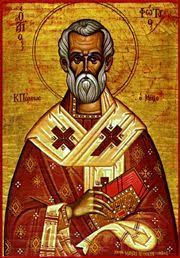
If the previous post was a repeat at least let me try to say something new with this one. I concluded the previous post with Joshua Efron’s final words on his case for the James passage being an interpolation:
External evidence thus complements and strengthens the findings of internal criticism. This passage is an insertion, and by its contents and style can only be a Christian interpolation. (336)
I did not quote the footnote Efron appends to that conclusion. Here it is:
Josephus obviously totally disregarded the young Christian congregations in their first stages of development, despite his extensive detailed descriptions of the period before the destruction of Jerusalem and the Great Revolt. As a historian and writer addressing non-Jewish readers, defending Judaism and aspiring to gain appreciation for it, he preferred to delete sensitive, inconvenient manifestations likely to arouse a negative reaction and controversy. The three “Christian” passages — the crucifixion of Jesus, the death of his brother James and John the Baptist’s death — are exceptional in spirit as well as in their artificial contextual interpolation. Similarly Josephus’ contemporary and rival, Justus of Tiberias, author of a Jewish history in Greek, who did not however renounce his people, made not the slightest mention of Jesus or the miracles he wrought, as noted in Byzantine Christian testimony of Photius, Bibliotheca, Codex 33, PG 103; Photius, Bibliothèque, ed. R. Henry, vol. 1 (Collection Bude-Paris 1959), p. 18f: τής Χρίστου παρουσίας και των περί αυτόν τελεσβέντων καί τών ύπ’ αύτοΰ τερατουργηθέντων ούδέν δλως μνήμην έποιήσατο. See also Τ. Rajak, “Justus of Tiberias,” CIQ 23 (1973): 345 ff. Philo’s complete silence is equally significant. (336f)
In Efron’s earlier outline of the gospel narratives about Jesus (319-324) it is very clear that he considers the entire story an ahistorical, anti-semitic theological drama through and through. In that context one’s eyebrow might be felt to raise just a little at the above footnote. I might be quite wrong, of course, so am very willing to retract this post if necessary.
Efron, Joshua. Studies on the Hasmonean Period. Leiden; New York: Brill, 1987.
If you enjoyed this post, please consider donating to Vridar. Thanks!

The James Reference (Antiquities 20.9.1) consists of a seven-word digression from a rambling tale about a high priest’s ordering of numerous executions by stoning; including of James: “brother of Jesus, who was called Christ.” This lone blip about James is extraneous to the chapter’s main plot. The digression’s brevity furthers suspicion because Josephus typically devotes expansive text to character development, even of lesser players. Why the mere passing quips about Christ’s kin?
As well, “Christ” appears in Antiquities only in this James Reference and in the notorious 18.3.1 interpolation. The James Reference would be an incomprehensible loose end but for the prior mention of Christ in 18.3.1. Thus, if 18.3.1 falls so too must 20.9.1.
In Efron’s chronicles Josephus perspicaciously pre-emptively redacts interpolations.
Yes indeed. A fair case can be made for the words “brother of Jesus who was called Christ” being a gloss. If so, and if we toy with the idea that the larger passage itself is an interpolation, then the gloss has been a secondary addition.
But if those words are a gloss then with Efron’s larger argument we are looking at a Christian interpolation that does not mention Jesus at all. Given our recent reading and posts of Rivka Nir’s case for the John the Baptist passage being a Christian interpolation, we would then have two passages with no mentions of Jesus being inserted by Christians.
Nir suggests polemical reasons for the John the Baptist passage. One may be left wondering if the identity and the place of James in Christian foundation stories were becoming problematic, with (as Efron notes) with several variants emerging. Questions.
Reminds me very much of Nicholas PL Allen. He too has published on the Josephan James passage arguing it was interpolated; it is likewise very plausible he is a mythicist or in any case with his citation of Earl Doherty, for example, it is clear he at least is not blinded with prejudice against mythicists. His James article: http://www.tandfonline.com/doi/abs/10.1080/2222582X.2017.1317008
One may request the same article from Nicholas Allen’s researchgate page: https://www.researchgate.net/profile/Nicholas-Allen-13/research
He has a book out called “Josephus Interrupted” which is pricey, but it seems to be just a polished version of his doctoral thesis published online free. Aims to show all evidence outside the gospels for Jesus, John the Baptist and James are interpolated in Josephus and goes over Tacitus as well. https://repository.nwu.ac.za/bitstream/handle/10394/14213/Allen_NPL.pdf
On a side note:
• Allen, N. (2019). Josephus and Luke-Acts: A critical review of a thesis by Steve Mason. (Available Online)
Cf. Mason, Steve (1992). “Josephus and Luke-Acts”. Josephus and the New Testament. Massachusetts: Hendrickson Publishers. pp. 185–229. ISBN: 9780943575995.